In February, 27-year-old independent photographer Holly Turner left her apartment in New York City and embarked on a long-awaited vacation. Despite not working a single day that month, she felt as financially secure as ever.
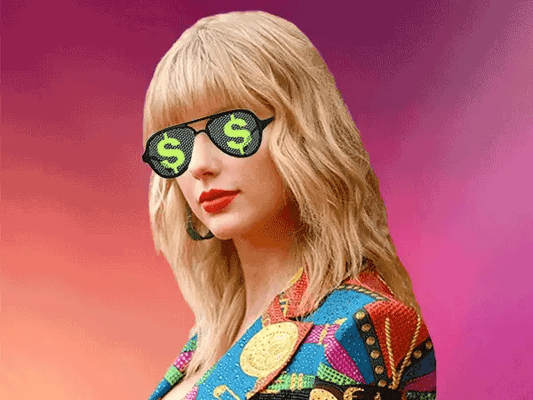
“If I wanted to get a coffee, I didn’t have to think twice about it — that’s the first time in my life that’s happened,” she told The Hustle.
Turner usually makes her living photographing live musical performances, shooting artists like Billy Joel and Kelly Clarkson. But she made money during her vacation because of a separate hobby: selling personally designed Taylor Swift merchandise on her Etsy store.
Turner started her shop last November, around the time Swift announced her Eras Tour. That tour, which began in March, is expected to be one of the most lucrative in history, generating ~$11.3m from tickets and ~$2.4m from merchandise every show, according to industry analysts.
It’s also opened up a market for Swiftie entrepreneurs. As fans swarm concert venues for Swift, some have chosen to forgo hourslong lines to buy official concert merchandise, and others couldn’t afford tickets in the first place.
Instead, many have purchased Swift-related merchandise from online shops that can gross several thousand dollars per month.
Lately, Turner has been making four to six sales a day of Swift-inspired hats, sweatshirts, T-shirts, candles, and more — enough to cover her monthly rent.
“Honestly,” Turner said, “running this Etsy shop has been pretty life-changing financially.”
A ‘pretty big hole in the market’
In the economy surrounding Taylor Swift, concert outfits are almost as important as concert tickets. Retailers like Francesca’s, Altar’d State, and Hazel & Olive report skyrocketing sales for clothes with a Swiftie aesthetic, like “sparkly sequined dresses, cowboy hats, and rhinestone boots.”
And that’s just for the wardrobe to wear to the show. Fans are buying official concert merchandise, too.
- Swift sells apparel, tote bags, water bottles, glow batons, and posters during her shows, as well as at pop-up stores at the venue prior to the show.
- Concert-exclusive merch, which is not available on taylorswift.com, has been the most popular: “Every Swiftie wants the blue crew,” one fan told The New York Times about a plain blue crewneck sweatshirt.
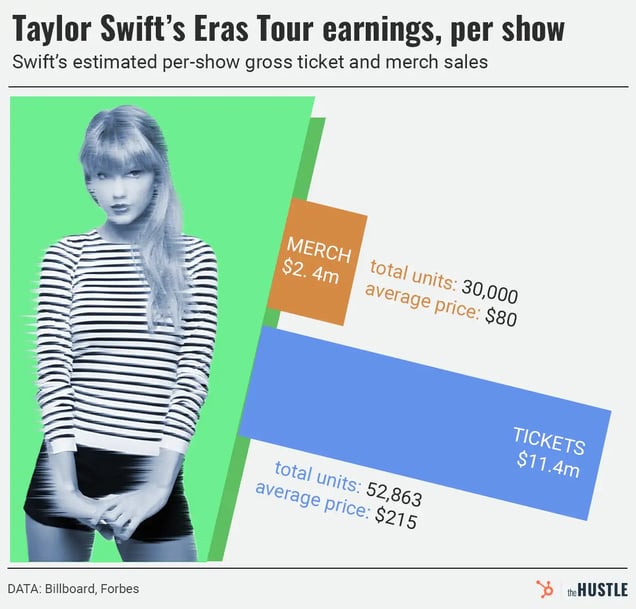
The Hustle
But snagging Swift gear is neither cheap nor easy. The blue crewneck costs $65, T-shirts sell for $45, and hoodies run $75.
Long lines are the norm: Houstonians waiting to get inside the pre-show store stretched along the side of a road for over a block. Fans arrived at Chicago’s Soldier Field as early as 4:30am, nearly six hours before the merch store opened.
On top of all that, others have found the official merch to be a little, well… basic.
“Taylor Swift has had a reputation for having really good merch up until the ‘Reputation’ album,” said Turner, an avid fan who runs a Tumblr devoted to fair-priced Eras Tour tickets, and once received $3k as a gesture of support from Swift herself at the start of the pandemic. “[Since then] it’s felt like just the same photo slapped on a bunch of times. I saw a pretty big hole in the market.”
As did hundreds of other Etsy sellers.
Kaitlyn Crawford, a 25-year-old who lives in South Florida, runs a custom embroidery shop on Etsy. She recently launched Swift-themed apparel, offering her customers the option to customize their sweatshirts with concert dates, locations, and even scannable Spotify codes.
“I wanted to be different,” Crawford said. “I wanted something they could actually do with the design.”
Crawford, who started her Etsy shop in 2020 when her job prospects dwindled during the pandemic, said the embroidery business is now her full-time job. She’s even earned enough money to finance and pay off two industrial embroidery machines, both of which cost more than $15k.
That’s what makes her customizations possible, she said, and gives her business its edge, bringing in an average of $4k per month in gross revenue, maintaining a 50% profit margin.
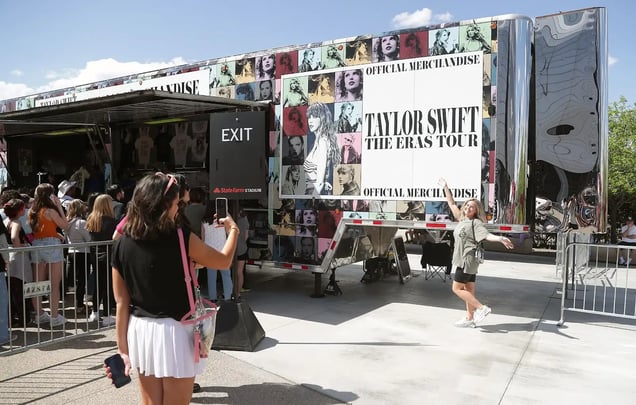
Fans gather to buy Eras Tour merchandise in Glendale, Arizona (John Media/Getty Images)
Erika Cea, a 20-year-old who lives in the Philippines, runs an Etsy shop selling Taylor Swift-inspired posters. She primarily sells digital downloads — images that can be printed and framed by the customer after purchase — for an average of 300 sales a month (most without shipping costs).
“At first, it was just an experiment to see if I had what it took to start an online business — I never expected thousands of people to like my designs enough to purchase them,” Cea explains. “Now, my Etsy shop is a way to help my parents finance my expenses while I’m in university.”
The legal challenges
Turner got into the Taylor Swift merchandise business when she was inspired by Swift’s song “Midnight Rain.” She sketched out a T-shirt design in Photoshop and used the purple and orange hues from Prince’s iconic “Purple Rain” album cover, creating a unique, vintage-looking twist on Swift’s song lyrics.
“I was like, ‘I don’t care if anyone buys this, I have to make it for myself,’” Turner recalled.
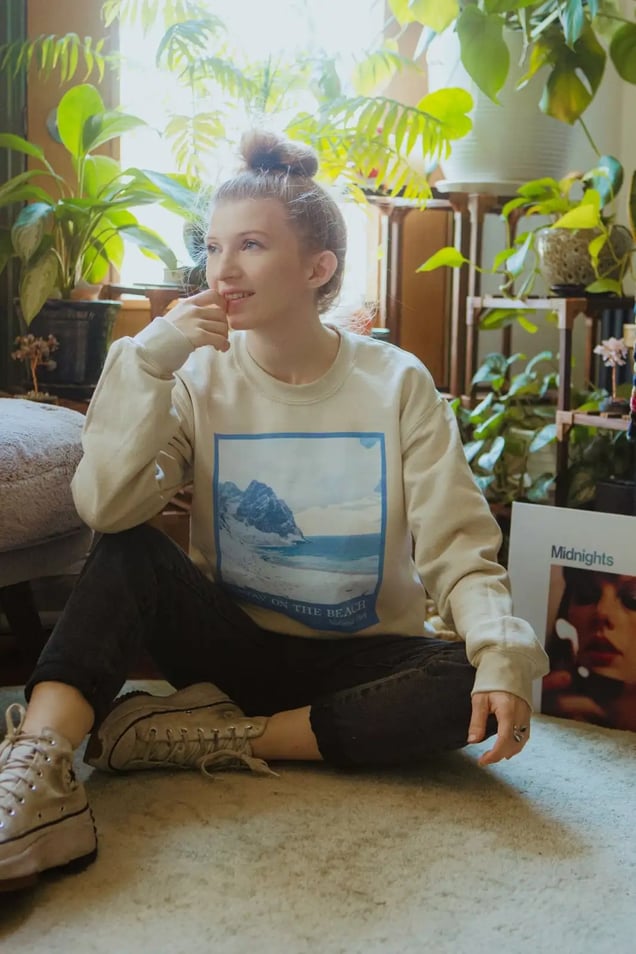
Holly Turner in a “Snow on the Beach”-inspired crewneck (via Holly Turner)
But Turner had to think carefully about the design: Making fan merch is legally precarious.
Alyce Zawacki, an attorney who specializes in entertainment and intellectual property law, said there are three elements of law that come into play:
- Copyright infringement, which could include use of an artist’s album covers, lyrics, or imagery
- Right to publicity, which includes an artist’s right to their own name, image, and likeness
- Trademark enforcement, which may include anything the artist has sought to trademark for themselves
“In the case of Taylor Swift, she has over 200 trademark registrations,” Zawacki said. “She has a trademark on the word ‘Swiftie.’”
That leaves “little room for a fan to create merch without stepping on any of these areas,” according to Zawacki, who warned that artists like Swift could strictly enforce their trademarks and copyright if they desired. In 2015, Swift threatened Etsy sellers with legal action, prompting many to criticize the artist.
“Clearly Taylor Swift and her attorneys aren’t going after everyone who is doing this, or they don’t have the capacity to, or they just haven’t caught up on sending cease-and-desist letters yet,” Zawacki said.
Swift’s management did not respond to an interview request from The Hustle.
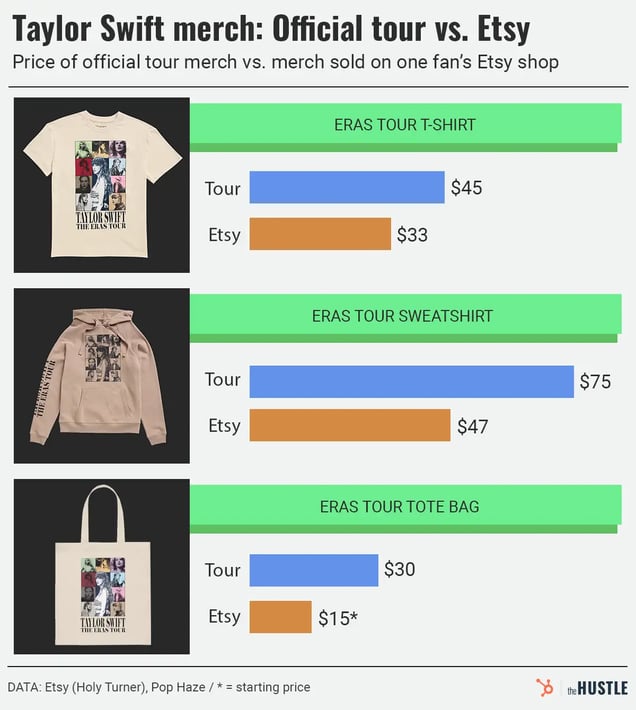
The Hustle
Before launching any products, Turner searched the US Copyright Office’s records for Swift lyrics that have been protected. Various lawyers have also cataloged Swift’s trademarks.
“All of the lyrics I use are not copyrighted,” said Turner, whose Etsy site and apparel do not include Swift’s full name (which is trademarked).
For Turner, a creative herself, the issue is also personal: “There’s a line I don’t cross,” she said. “I don’t use [Taylor Swift’s] image. As a photographer I know that. As a fan of Taylor, too, I see Etsy shops that just straight up steal her stuff, and that weirdly upsets me. You’re just stealing from other graphic designers and photographers.”
Cea and Crawford have also noticed that the internet is full of copycats.
“I’ve seen some of my designs floating around Pinterest and Instagram without my consent or any credit to me,” Cea said. “Some people even resell them on Amazon and on Etsy. I’ve cautioned my buyers to avoid purchasing products with stolen designs, and I have been reporting shops that are infringing on my copyright.”
With so much merch available — and reports of official concert T-shirts fading after a single wash — quality is another important part of the women’s merchandise.
Crawford runs her business entirely from her house in South Florida, designing patterns and running them on embroidery machines herself. On Etsy, customers are searching for unique, high-touch items, she said, which means the bar is high.
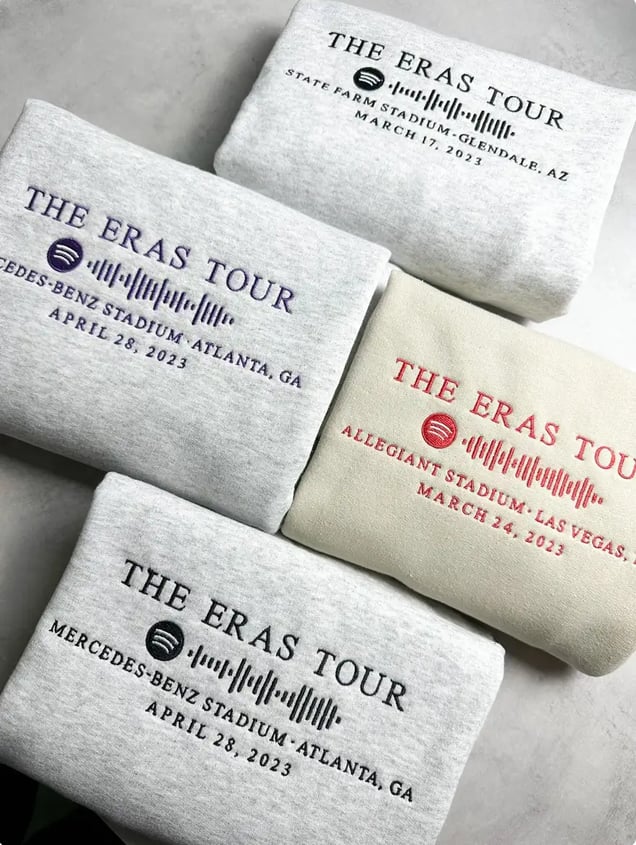
Customizable sweatshirts from Crawford’s Etsy store (via Etsy)
Ultimately, Turner sees her originality and quality (she prints her designs on Comfort Colors T-shirts and hoodies, a well-known garment brand) as the main appeal of her products.
“I think people can see through stuff really easily,” Turner said. “It’s pretty obvious who is doing it as a quick cash-cow kind of thing. If you’re chasing a quick buck, it’s not going to work out.”
When the tour ends
Cea, Crawford, and Turner all emphasized that Etsy businesses are still… businesses. Although the platform offers help with tasks like calculating sales tax and printing shipping labels, the three sellers say there’s still work required behind the scenes.
- Most of the work involves creating new designs, improving SEO, strategizing marketing plans and social media posts, managing international shipping, and handling customer feedback.
- Crawford gets assistance from her mother and fiancé in South Florida. Turner estimates that she works between 10-20 hours per week on her Etsy shop.
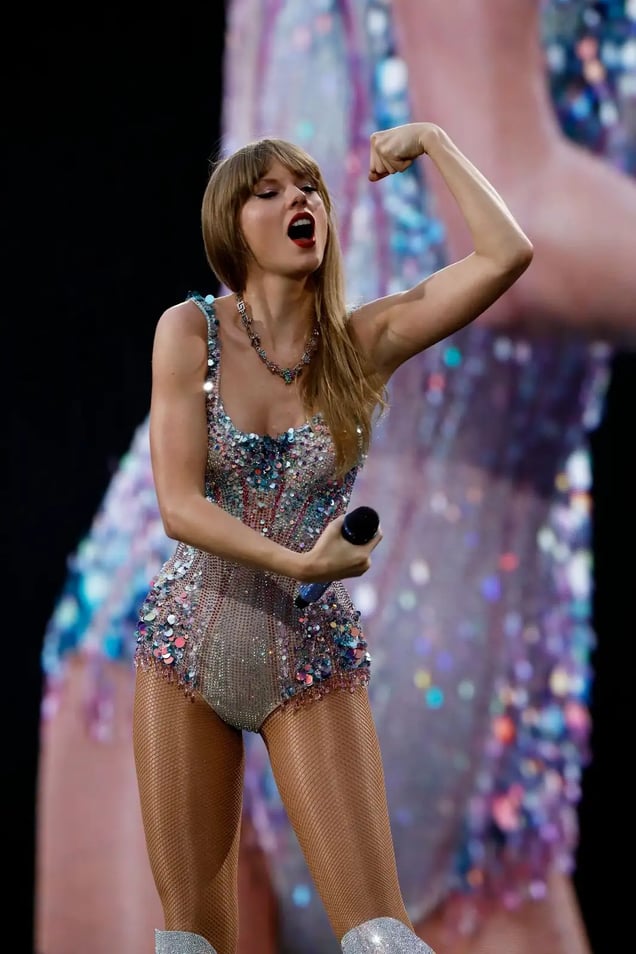
Swift flexes on stage in Chicago. (Natasha Moustache/Getty Images)
The time is worth it.
“I just love Taylor Swift. Whenever I’m working on this, it feels like I’m just having fun,” Turner said.
She has no plans of stopping when Swift’s tour ends, either. In fact, Turner hopes her business grows enough so that she can begin an entirely new era: one where she designs music-related merchandise as a full-time job.